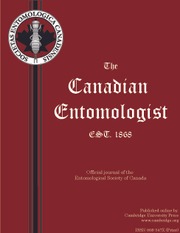Article contents
THE OPERATIONS OF A PREHISTORIC BEETLE
Published online by Cambridge University Press: 31 May 2012
Extract
Some years ago, I received from Prof. G. J. Hinde, of Toronto, a twig of juniper about as thick as, and a little longer than, one's finger, which he had taken from interglacial deposits at Scarboro', near Toronto, and which showed the marks where beetles had bored the surface just beneath where the bark had been. From the same locality a number of remains of beetles have also been found, mostly Carabidæ, two of which I described at the time as new species of Loricera and Loxandrus. The others still remain unpublished, but there are none among them which could have made these borings, as these are evidently the peculiar work of some species of Scolytidæ, and apparently one of the Hylurgini, though in our very imperfect knowledge of the characteristics of the mines made by existing forms of this family, it is difficult to pronounce on its relations.
- Type
- Articles
- Information
- Copyright
- Copyright © Entomological Society of Canada 1886
- 2
- Cited by


